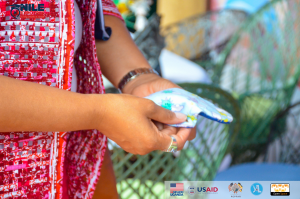Empowering Girls in Uganda: Doreen’s Story of Creating Sustainable Change with Reusable Sanitary Pads

Empowering Young Girls Through STEM Learning: A Look at Nile Explorer Bus’ Alignment to International Women’s Day 2023
March 8, 2023
The Nile Explorer Bus: Empowering Education on Wheels
May 30, 20231 in 10 girls misses school during their period, because they do not have access to sanitary pads, and are ashamed to go to school and be ridiculed, often by their male peers. This absolutely horrid fact was revealed by the United Nations Educational, Scientific and Cultural Organization (UNESCO).
Worse still, in Uganda, and mostly in the rural areas, parents are not able to afford sanitary pads for the girls. Local shops stock sanitary pads that cost on average 5,000 Ugandan shillings ($1.50) a packet – too expensive for most of the predominantly peasant families. Desperate to stop the monthly flow, girls most often resort to using pieces of cloth, shreds of foam mattresses, toilet paper, newspapers, banana plant fibers and even leaves. Not only are these options ineffective and uncomfortable, but are also extremely unhygienic, putting girls at risk of diseases.
Doreen Kemigisa, a student of Tooro High School, Fort Portal-Kabarole, was deeply touched by the fact that her own peers would miss classes because of this..
“The girls in my community often skipped school during their menstrual periods because they feared shame. They either used sanitary towels that would leak into their skirts, or would miss school for over a week because they couldn’t afford the expensive pads sold in the market,” narrated Doreen.
Girls in rural areas face more barriers to menstrual hygiene than their counterparts in Urban settings. This was worse during the COVID-19 pandemic period, where rural girls were affected in that they were at home and could not access sanitary pads, forcing them to resort to other means of soliciting funds, and ending up pregnant as a result.
Doreen witnessed this issue first hand happening to the girls around her, and decided to take the initiative to start making reusable sanitary pads, providing them as an alternative to the expensive disposable ones.
“The Nile Explorer Bus came to our school and taught us about menstrual health. I then got the confidence and the idea on how to protect my fellow girls in school, and because most of them face the challenge of lack of sanitary pads, I set out to begin making reusable sanitary pads that can last up to 6 months,” she recounted.
Aside from starting up an operation to sell these pads and make some money, Doreen was a girl on a mission to change the lives of her fellow peers too. She set out to educate them on how to make their own reusable sanitary pads using available resources like plastic paper, cotton cloths, needles, threads, buttons, pins, and scissors, which materials are way cheaper and easily accessible in her community.
“The people around my school and community now know how to make reusable sanitary pads on their own because it is safe. Nowadays, the girls rarely miss their classes as they used to because they now know the techniques on how to make their own pads from the available materials.
One of the goals of The Nile Explorer Bus is to ensure girls stay and excel in school, so that they can realize their dreams and provide a better future for themselves, and their families. Proper menstrual hygiene management not only allows them to live comfortably, but also makes them more confident and increases their chances of staying in school.

U.S Ambassador to Uganda, Natalie E. Brown, Interacts with Doreen Kemigisa at the American Center during the Nile Explorer Youth Summit, holds in her hands, one of the reusable sanitary pads made by Doreen.
UNICEF`s report of March 2019 on Guidance on Menstrual Health and Hygiene envisions a world where every girl can learn, play and safeguard her own health without experiencing stress, shame, or unnecessary barriers to information or supplies during menstruation.





1 Comment
Thanks for a good work to support
young Ugandan generation